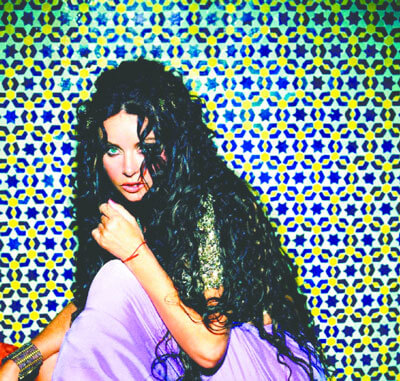Sarah Brightman will turn the Garden into a kasbah for one Arabian night
Sarah Brightman. Two simple words that conjure myriad images; extremes from powerhouse soprano to backlit pop princess. If you’ve already got some Brightman in your CD collection, then make room for “Harem,” her latest Middle Eastern-flavored release guaranteed to only add to her worldwide tally of 15 million albums sold.
Speaking to someone who’d dismissed her over-the-top earthy image as Stevie Nicks taking a wrong turn onto Broadway via outer space, the blue-jeaned Brightman had to work double time to convince this reporter that her Friday night date at Madison Square Garden would be one worth attending. And though Brightman shimmered and clinked on cue, she also surprised by leaning across the table with an efficient “Give us it here” before her lacquered nail tore through the troublesome shrink-wrap around a sealed cassette tape.
While still not classing her with the jungle cats, our close-to-an-hour chat in the New York offices of Angel Records—Brightman explains EMI’s classical arm by saying “You know, they have all these different groups”—reveals a much more utilitarian diva than anticipated. She periodically stops to pick up the recorder. One hand glitters with a charm bracelet anchoring both a diamond-encrusted cross and Arabic moon while the other is adorned with a simple, red Kabbalah string. She leans over the machine and frets, “Is it working?”
And working is something the perennially jet lagged Brightman knows a thing or two about. Her latest, self-described “fantasy record” logged session time in usual haunts like Abbey Road and studios in Hamburg, Paris and Toronto, but also took her to places as far flung as Cairo, Beirut and Prague.
“Vocally, this is different for me,” Brightman explained. “I actually took off a lot of time from live work, which I’ve never done before. I’m known as an interpreter of music, singing songs and arias, but I wanted this to be more of an atmosphere album as opposed to just singing a song. I wanted the voice to be layered and interesting. It took quite a while to do.”
Brightman described “Harem” as “a mixture of inspiration I got from literature, art, and music.” She doesn’t see the Eastern influence as anything new either, citing as earlier experiments with the form a song she recorded years ago called “You Take My Breath Away”—included on “Harem” as a bonus track—and a sitar-fusion piece from the “Eden” album called “In Paradisium.”
“I’ve actually been doing little bits of this for a long time,” she explained, “but I’ve always wanted to do a project of this type because I’m a child of literature.”
Paul Bowles, “The Thousand and One Nights” and “Lawrence of Arabia” all make the cut as influences.
“All the cinematic things,” as Brightman put it, adding, “I’ve liked Indian and Persian poetry as well. Being brought up in England and continental Europe, there’s always been a fusion of world music around me anyway. You can go to Istanbul in two hours from London. Everything’s nearby.”
In fact, Sarah’s first taste of desert life came when she was just a little girl, a tiny dancer at the Elmhurst Ballet School. Her parents took her to Northern Africa on holiday.
“I believe it was Tunisia,” Brightman remembered, “I also traveled to Marrakech when I was younger. I’ve always liked the idea of the outsider in these areas. It’s why I like Paul Bowles. It’s also why I called the album ‘Harem.’ It means forbidden place if you translate it. It’s in your imagination, but you don’t really go there. You maybe don’t want to go there, but it’s a mystical place. It’s ancient. People have journeyed there and come back changed.”
Still, Brightman allowed that if a more strident singer/songwriter––let’s say Sinead O’Connor––recorded an album called “Harem,” we’d probably hear clearer views on Palestine, the fate of women within the patriarchy, and religious tolerance. Brightman seems fine with the difference.
“I don’t think in political terms,” she said, “I don’t have anything to say about that. I don’t know enough about it. I love art. I love culture. I’ve always felt very integrated in many different cultures because of how I’ve been brought up and how I’ve lived. But in many ways, I only understand about music.”
Her cover of “What a Wonderful World” notwithstanding, reality has a way of encroaching on even the most rose-tinted environs. The new album also presents a Middle Eastern sampler of singers as contemporary as Natacha Atlas to as “beloved and best-known” as Kadim Al Sahir and when Brightman decided to take “Harem” on the road in her inimitable, arena-razing style, she wanted to bring these musicians with her. But, Friday’s date at Madison Square Garden may not see exactly the same international line-up she was able to put together by globe trotting for the album.
Yet, Brightman remains unfazed.
“There were a couple of musicians I wanted to take,” she admitted. “But I didn’t see that there should be a problem. They’re musicians. It’s about music, not any political situation. It’s just unfortunate, these situations do arise in the world, but time will pass and things will sort themselves. People will see things more clearly and get things into perspective.”
If that sounds like a citizen of the world talking, it’s because it is.
“My family home is in Spain,” said Brightman in cataloging her residences. “A smaller home—it’s like a shoebox, actually—is in a village outside of Milan. My singing coach for my classical work lives in the next village. My boyfriend is in Germany. And I have a home in London, which I’ve had for years.”
When asked about a typical day, Brightman pickd Milan: “I get up early. A lot of farmers live in this village. I go and get my cappuccino and they think I’m the weird English girl. There aren’t any other people from anywhere else that live there. The café is opposite the subway that goes into Milan so you watch people coming and going. It’s quite fun. Then I go back to my pad and get myself together, walk to my singing coach’s house and work with her for about two hours. Then she cooks some spaghetti. Her husband’s name is Enrico. He’s a classical musician. We all have spaghetti. Then I go home.”
When you’re this far afield, it’s difficult to keep tabs on your relevance in a temperamental marketplace. Brightman cops to “tricky times for artists slightly older like myself,” but also remembers her 1990 U.S. signing when music biz legend Jerry Moss heard her sing Mozart’s “Hallelujah” and hit her up with the typical, “What else you got, kid?”
She relayed a recent chat with her London hairdresser requesting a story from her British heyday. Brightman replied, “I’m probably going through my heyday in the rest of the world right now, but not here.”
“That sums England up, they remember me for ‘Starship Trooper’ and being married to my ex-husband. That’s it. I’m nothing there,” she laughed, asking, “What do they say, never a king in your own country?”
Oddly, it’s ex-husband Andrew Lloyd Webber that’s one of her bellwethers today. In fact, he leant her the A.R. Rahman song, “The Journey Home,” from his hit West End Bollywood musical “Bombay Dreams,” though returned the favor might be a better way to put it.
“When I was with my ex-husband,” Brightman explained, “he didn’t really take in things like Indian food and culture.”
Brightman, whose family lived for long stretches in India and even has relatives buried in Puna, continued, “I was into it and used to cook him Indian food. So when I asked him for the song, he said yes, it’s not my music anyway, so be my guest.”
Any other bellwethers for Brightman? Her loyal gay fan base, which, Brightman marveled, “has always been very strong, really since ‘Starship Trooper’ all those years back. I mean, I was 17 years old when that song hit. People always ask how I feel about having such a strong gay following and I’m happy about it. This community is very in-the-know when it comes to art, culture and music. I feel privileged to be taken in by them. I think, God, it’s probably good what I’m doing. It’s always a good indicator. If the music is really good, then people are going to buy it. It might be a little more difficult to be accepted by the media, but I’ve sold all my albums with no MTV or VH1. I trust that. Now I know I can really trust my work, so I keep going.”


































